 |
| Licking ice sculptures can seriously damage your tongue |
Irkutsk - Listvyanka - Lake Baikal
6,256 Miles GMT +9 hours Temp
-19
We had most of the day to explore Irkutsk,
starting with a beautiful sunny morning but still bloody freezing. Sadly the
museum to the Decemberists was closed. However we did find some of the original
wooden houses from the late 1800’s, Bogoyavlensky Cathedral, the 18th
century Saviours church and a collection of ice sculptures in the centre of
town. It was immediately obvious when walking round today just what a wealth of
cultural diversity there is here. Tuvans, Buryats, Mongols, Russians, Poles and
at leat one Geordie. I’ve seen more ethnic diversity today than I have in the
rest of Russia combined. I’ve also seen more fur coats than I think I have in
the rest of my life, but this is the commercial centre of the Russian fur
trade. The mink slippers were tempting but the hat is more practical.
The people are brilliant, so friendly as they
are used to tourists here and quite a few people are learning English and want
to speak and practice. People seem a lot more relaxed here, so chilled they
take camels for walks.
Lena challenged me to eat ice cream outside at -19.
Well howay, how hard can it be lyke? Two bites, it stuck to my mouth and
protruded like one of Madonna’s famous cones. Lena and Anya ended up on their
knees in the snow laughing, and I needed to wait until she stopped and got me a
cup of tea to release me from the ice cream gag. Combined ages of 130
something, going on 9.
 |
| Ice breaker waiting for Spring |
My love of six degrees of separation has been
further fed. The ship in one of the photos is one of the ice-breakers from Lake
Baikal parked up for the winter. In the local museum I found out that the
original ice-breaker was made in kit form and came from Newcastle England, it’s
long gone and languishes at the bottom of the lake somewhere. Some research
required when I get home, as my grandfather might have had a hand in making it.
A local train to Listvyanka, on the shores of
Lake Baikal, followed by a trek to a bus stop for a bus to our final
destination, Buguldeyka. The bust top was in the middle of nowhere. I asked
Lena if she knew where she was going, “oh yes, I was here four years ago”……not
the kind of reassurance I was looking for exactly, however we did find it. The
bus was late according to the timetable, which is a first, so we had to run
round the bus top periodically to keep warm – tuggy round a bus stop in
Siberia, who’d have thought it, this trip just gets more surreal by the mile.
 |
| probably the coldest bus stop in the world |
We
are staying in a small wooden cottage right on the side of the lake. It’s next
door to our host’s Sergei and Alina, and are delightful and so hospitable. The
fire and stove was ready lit for us, fresh fish and bread in the larder, they
have shown us the wood pile and told us that if we need anything just to ask.
The cottage is small and very rustic but it’s
homely and truly Siberian. Buguldeyka is a tiny village of around 18 wooden
houses, and bar that doubles as a village shop. This is kind of the Lake
District of Siberia but without the tourists or the sheep.
The lake is the
world’s deepest freshwater lake. It contains more water than all of the North
America’s five great lakes combined. It’s 395 miles north to south, 37 miles
wide and more than a mile deep. That’s one hell of a puddle. However, at the
moment its one hell of an ice rink, frozen to a depth of up to 10ft, and it’s
crystal clear if you wipe the surface snow away.




























